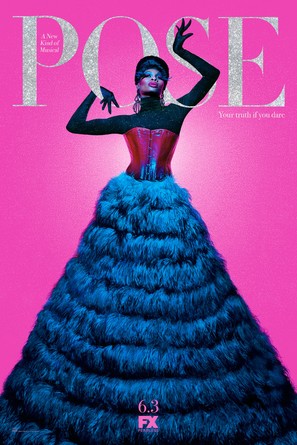Pose: “Pilot” (2018)

| |
| Directed by | Ryan Murphy |
|---|---|
| Running time | 1h 17m |
| Core concepts this week |
ballroom culture kinship queer utopia utopian performance potentiality |
| View on Amazon Prime | |
Background
Pose is a TV drama focused on the 1980s and 1990s ballroom scene in New York City, in which primarily Black and Latinx LGBTQ people, organized in “houses,” compete for trophies based on fashion and dance performances. Season 1 takes place in 1987. The show was created by Ryan Murphy, Brad Falchuk, and Steven Canals. It was nominated for a number of awards, including the Emmy for Outstanding Drama Series. Billy Porter won the Emmy for Outstanding Lead Actor in a Drama Series. At least 140 LGBTQ people have worked as part of the Pose cast and crew. Janet Mock, one of the series’ writers, was the first openly transgender woman of color to write and direct an episode of television.
Plot summary
Episode 1 opens by introducing several figures in the House of Abundance, led by house Mother, Elektra; this opening scene also highlights the tension between Elektra (Dominique Jackson) and her daughter, Blanca (MJ Rodriguez). The characters steal antique pieces from a New York City museum in order to use them to compete at a ball that night. They perform well, but they are immediately arrested. The episode then cuts to Allentown, PA, where Damon (Ryan Jamaal Swain) has a confrontation with his father over his passion for dance and his homosexuality. He is kicked out of the house and leaves for New York City. Blanca learns that she is HIV positive, and discusses her diagnosis with Pray Tell (Billy Porter), who encourages her to pursue her dreams. Blanca decides to rent her own apartment and start her own house, and leaves the House of Abundance to start the House of Evangelista. She sees Damon dancing in the park, introduces him to the ballroom scene, and encourages him to join her house, which he does after spending several difficult weeks on the street. Meanwhile, Angel (Indya Moore), is a sex worker who meets Stan (Evan Peters), who works in Trump Tower and has a wife and children in the New Jersey suburbs, but cannot help but start falling for Angel. After a series of personal, professional and ballroom disappointments, Angel also decides to leave the House of Abundance for the House of Evangelista. The newly formed house challenges the House of Abundance and loses, but commits to coming back stronger. Blanca helps Damon pursue his dreams and enroll at a dance school.
Content warnings
One plotline of this episode and season involves Angel’s experiences a sex worker. One scene focuses on her first meeting with a client, although it contains no nudity or sexual contact. This episode also includes physical abuse by a parent and cocaine use. If you are concerned that the content of this episode will pose challenges for your school or classroom, the documentary Kiki may offer opportunities to discuss the readings and the history of ballroom culture.
Materials for this week
- Lesson plans [Word doc]
- Screening quiz [Word doc]
- Secondary texts
- Day 2: Bailey, Marlon M. “Performance as Intravention: Ballroom Culture and the Politics of HIV/AIDS in Detroit.” Souls vol. 11, no. 3, 2009, pp. 254-271. [pdf]
- Day 3: Esteban Muñoz, Jose. Cruising Utopia: The Then and There of Queer Futurity. NYU UP, 2009. (Excerpt provided: Chapter 6, “Stages: Queers, Punks, and the Utopian Performative,” pp. 97-115) [pdf]